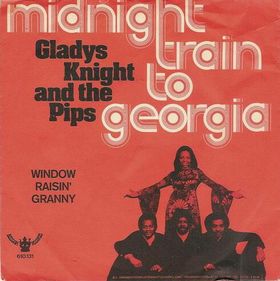 | Midnight Train to GeorgiaGladys Knight & the Pips |
Writer(s): Jim Weatherly (see lyrics here) First Charted: August 25, 1973 Peak: 12 BB, 11 CB, 3 GR, 11 HR, 2 RR, 19 AC, 14 RB, 10 UK, 14 CN, 52 AU, 2 DF (Click for codes to charts.) Sales (in millions): 1.0 US, 0.6 UK Airplay/Streaming (in millions): -- radio, 45.58 video, 295.27 streaming |
Awards:Click on award for more details. |
About the Song:The song started out as “Midinght Plane to Houston” in 1970. It was inspired by a phone conversation songwriter Jim Weatherly had with actress Farrah Fawcett. He’d called to talk to his friend Lee Majors, who’d just started dating Fawcett. He wasn’t home and she explained that she was packing to go visit her parents – she was taking a midnight plane to Houston. After getting off the phone, Weatherly spent 45 minutes writing a song RC which he explained “was about a girl that comes to LA to be successful but maybe she’s not successful but the guy loves her and goes home with her.” TC Cissy Houston recorded the song in 1972. She described it as “a country ballad that told a good story – about two people in love.” MM However, she wanted to change the title, saying “my people are originally from Georgia, and they didn’t take planes…they took trains.” MM The song also underwent a change in becoming about a woman following her man back to Georgia after his failure to become a star. Her version wasn’t a hit, but in the hands of the Pips it would become their only #1 on the pop charts. Gladys Knight & the Pips formed in 1952 when she was eight years old. Her siblings Bubba and Brenda and their cousins William and Eleanor Guest rounded out the group, originally known just as The Pips. By 1955, they were performing around Atlanta on the talent show circuit and in 1957 they signed a record contract with Brunswick Records. Two years later, the label dropped the group. The Pips would go through different members, have a a hit with “Every Beat of My Heart” in 1961 (#6 BB, #1 RB), and another label before signing with Motown in 1966. They picked up two more top-ten pop hits/#1 R&B songs with “I Heard It Through the Grapevine” and “If I Were Your Woman” before leaving the label for Buddha Records in 1973. The group recorded Weatherly’s song “Neither One of Us Wants to Be the First to Say Goodbye” and it reached #2 on the pop charts and #1 on the R&B charts. The group asked Weatherly if he had any more songs and he gave them “Midnight Train to Georgia.” Knight said she loved Cissy’s version but wanted “an Al Green thing going…something moody with…horns, keyboards, and other instruments to create texture and spark something in me.” MM She also changed some lyrics with Weatherly’s blessing and gave it some gospel ad-libs. She struggled with the latter so in the recording studio her brother Bubba fed her lines into her headset. MM It became the fifth R&B chart-topper for the Pips. Critic and author Dave Marsh called it “the best vocal performance of Gladys Knight’s career.” DM Resources:
Related Links:First posted 1/14/2024. |










